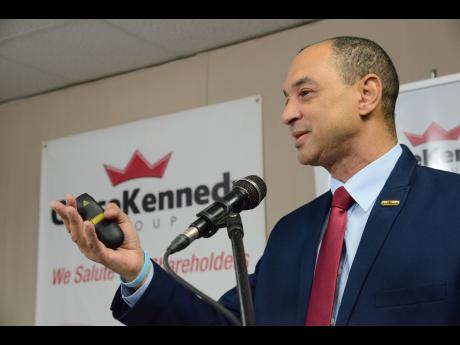(Jamaica Gleaner) Come month end, GraceKennedy Remittance Services Limited, GKRS, is headed to court to challenge a decision by the tax authorities in Guyana that it underpaid taxes there by more than $240 million.
At the heart of the dispute is how the Guyanese Revenue Authority, the GRA, has decided to classify the remittance company. GKRS operates as a non-commercial entity, but the GRA determined in May it should be classified as commercial and assessed its tax liabilities accordingly.
Parent company GraceKennedy Limited disclosed the dispute in its third-quarter earnings report.
On Wednesday, Group CEO of GraceKennedy Limited Don Wehby told the Financial Gleaner that the remittance subsidiary has filed taxes for more than 20 years as a non-commercial entity in that market.
GraceKennedy Remittance Services Guyana Limited began operating in the Georgetown capital nearly 26 years ago, in January 1993.
The GRA first wrote to GKRS on May 17 of this year, saying it was “incorrectly” classified as a non-commercial company, rather than a commercial company, and had wrongly paid taxes at the lower non-commercial rate. As such, it said GKRS owed “J$241,623,000, excluding penalties and interest if applicable”. That translates to around GUY$400 million.
The remittance company filed a legal challenge to the GRA’s assessment on October 26 and the case is set for hearing on November 28. It took that step after the GRA determined in late September, over the objections of GraceKennedy, that it would maintain its assessment.
Wehby declined to comment on the tax rates that GKRS is subject to in Guyana, and was unwilling to offer more details than what the conglomerate had already disclosed about the dispute in its financial report released last week.
GraceKennedy has made no provision for the tax charge in its accounts, saying it was confident it would prevail in court.
The conglomerate’s annual tax bill currently ranges up to around $1.6 billion annually, on profits of around $5 billion to $6 billion. Tax charges incurred so far this year, for nine months ending September, tops $986 million against profit of $4.7 billion.
The conglomerate’s tax bill is lower than the nearly $1.2 billion charges in the same nine-month period last year, because its profits are modestly lower. The company in 2017 had made extraordinary gains from the winding up of a non-operational subsidiary and acquisition a new business. With those one-off gains, profit after taxes in 2017 was $3.75 billion, but was $3.71 billion this year.
GraceKennedy said that comparison of the two nine-month periods on a normalised basis, that is, absent the fat from a year ago, its profits would have risen 12.6 per cent.

